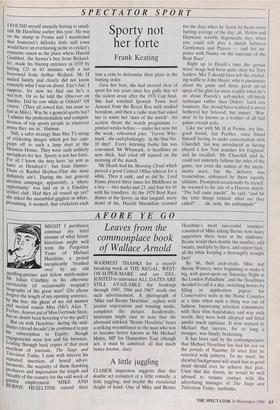SPECTATOR SPORT
Sporty not her forte
Frank Keating
I FOUND myself uneasily having to small- talk Mr Heseltine earlier this year. He was on the stump in Frome and I mentioned that Somerset's hillocky little mill town would have an everlasting niche in cricket's romantic canon as the place where Harold Gimblett, the farmer's boy from Bicknol- ler, made his blazing entrance in 1935 by hitting 123 in 63 minutes with a bat borrowed from Arthur Wellard. Mr H smiled faintly and clearly did not know remotely what I was on about. Fair's fair, I suppose, for now we find out he's a wet-bob. Or so he told the Observer on Sunday. Did he row while at Oxford? 'Of course.' (They all rowed fast, but none so fast as Mike). Was he a general sports fan? I admire the professionalism and competi- tiveness of top sports people in whatever arena they are in.' Hmmm.
Still, a safer strategy than Mrs T's string of .cricketing images which got her cam- paign off to such a limp start at the Mansion House. They were such unlikely metaphors for her. Sporty is not her forte. For all I know she may have 'an arm as hairy as Hendren's', but Joan Hunter- Dunn or Rachel Heyhoe-Flint she most definitely ain't. During the last general election campaign, apparently, a 'photo oPportunity' was laid on at a Finchley cricket club. Had they all tossed up yet? she asked the assembled gigglers in white, Presuming, it seemed, that cricketers each toss a coin to determine their place in the batting order.
Give her best, she had steered clear of sport for ten years since her gaffe that set the nation aroar after the 1978 Cup final. She had watched Ipswich Town beat Arsenal from the Royal Box with studied boredom, and then a radio man had asked her to name her 'man of the match'. An acolyte thrust the match programme — printed weeks before — under her nose for the weak, rehearsed joke. 'Trevor Why- mark', she said plonkingly, 'in the blue No. 10 shirt'. Every listening footie fan was convulsed. Mr Whymark, to headlines an acre thick, had cried off injured on the morning of the match.
Mr Heath had his Morning Cloud which proved a good Central Office wheeze for a while. Then it sank, and so did he. Lord Hume played three times for Middlesex as a boy — two ducks and 23, and four for 81 with his trundlers. At the 1979 Boat Race dinner at the Savoy, in that languid, misty drawl of his, Harold Macmillan yearned for the days when he 'knew by heart every batting average of the day, ah, Hobbs and Hayward, terribly degenerate days when you could still play a match between Gentlemen and Players — and bet six- pence with Nanny on the outcome of the Boat Race'.
Right up to Heath's time the grouse moor image had been quite okay for Tory leaders. Mrs T should have left the cricket- ing waffle to John Major, who is passionate about the game and those great nil-nil specs of his glint far more readily when he's on about Pocock's soft-wicket off-break technique rather than Delors' hard ecu bouncers. She should have realised it never bothered her beloved, but unmet, 'Win- ston' to be known as a loather of all ball games except polo.
Like me with Mr H at Frome, my late, good friend, Ian Peebles, once found himself having to make conversation with Churchill. Ian was introduced as having played a few Test matches for England, and he recalled: `Mr Churchill said he could not remotely fathom the rules of the game, nor even the names of the imple- ments ,used, but the delivery was tremendous, enhanced by those squishy sibilants. Prompted occasionally by myself, he warmed to his tale of a Harrow match: "The ball came pascht", he said, "and hit the little things behind: what are they called? . . . ah, yesh, the schtumpsh!"


































































 Previous page
Previous page